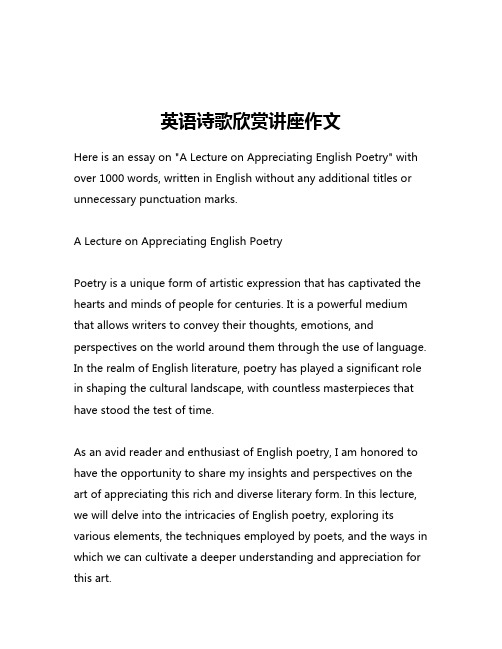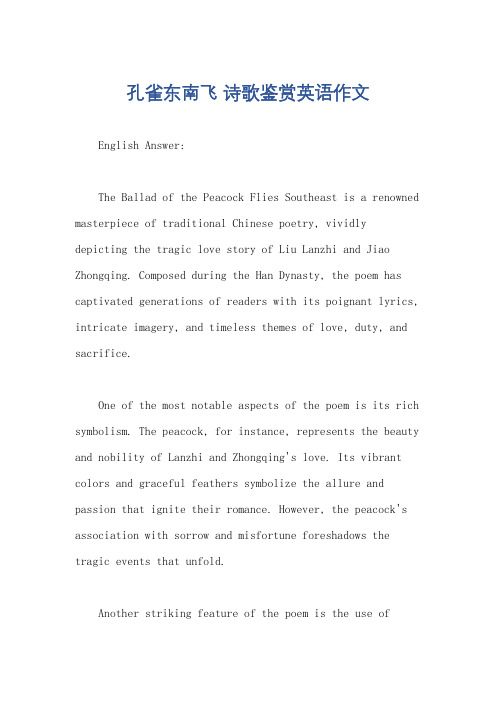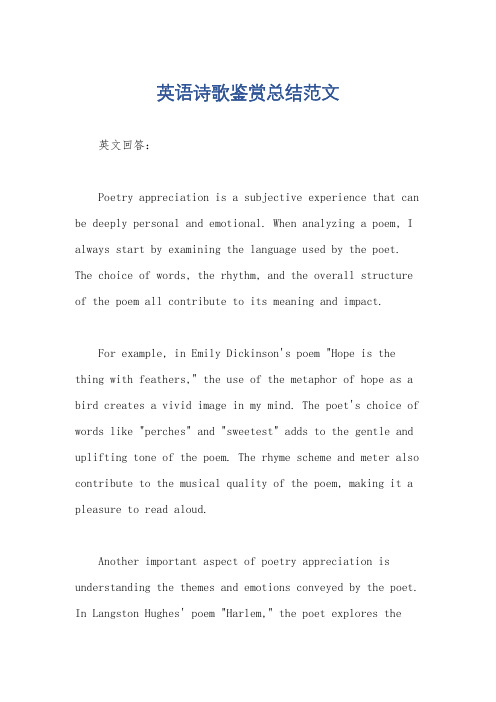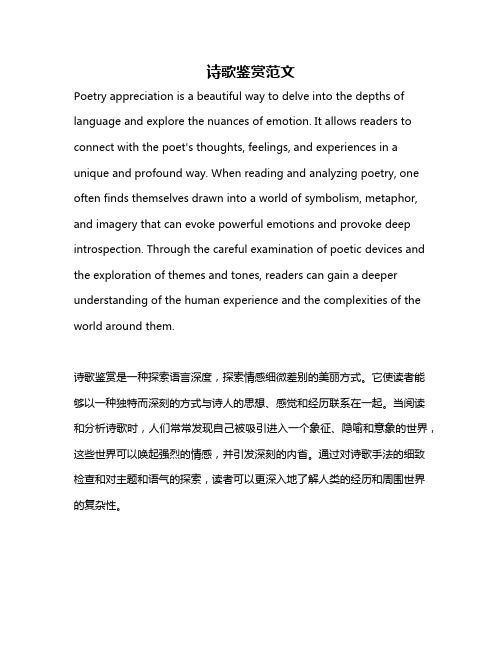英语诗歌鉴赏论文
英语诗歌鉴赏的英文作文

英语诗歌鉴赏的英文作文下载温馨提示:该文档是我店铺精心编制而成,希望大家下载以后,能够帮助大家解决实际的问题。
文档下载后可定制随意修改,请根据实际需要进行相应的调整和使用,谢谢!并且,本店铺为大家提供各种各样类型的实用资料,如教育随笔、日记赏析、句子摘抄、古诗大全、经典美文、话题作文、工作总结、词语解析、文案摘录、其他资料等等,如想了解不同资料格式和写法,敬请关注!Download tips: This document is carefully compiled by theeditor. I hope that after you download them,they can help yousolve practical problems. The document can be customized andmodified after downloading,please adjust and use it according toactual needs, thank you!In addition, our shop provides you with various types ofpractical materials,such as educational essays, diaryappreciation,sentence excerpts,ancient poems,classic articles,topic composition,work summary,word parsing,copyexcerpts,other materials and so on,want to know different data formats andwriting methods,please pay attention!Poetry is a form of artistic expression that uses language to convey emotions, ideas, and experiences. It is a unique form of literature that can be enjoyed by people of all ages and backgrounds. In this essay, I will explore the art of English poetry and how to appreciate it.One of the key elements of poetry is its use of figurative language. Metaphors, similes, personification, and other forms of figurative language are used to create vivid images in the reader's mind. For example, in William Wordsworth's poem "I Wandered Lonely as a Cloud," the speaker compares himself to a cloud, emphasizing his isolation and loneliness. Figurative language can be challenging to understand, but it is also what makes poetry so beautiful and memorable.Another important aspect of poetry is its use of sound. Poets use rhyme, rhythm, and repetition to create a musical quality in their work. This can help to emphasize certainwords or ideas and create a sense of unity within the poem. For example, in Edgar Allan Poe's "The Raven," the repetition of the word "nevermore" creates a haunting and memorable effect.In addition to figurative language and sound, poetry often explores deep emotions and experiences. Poets use their words to express feelings of love, loss, joy, and sadness. They may also use their work to comment on social or political issues. For example, Maya Angelou's poem"Still I Rise" is a powerful statement of resilience and strength in the face of racism and oppression.Finally, poetry is a form of literature that rewards multiple readings. Unlike prose, which can be read quickly and easily, poetry often requires careful attention and reflection. Each time a reader returns to a poem, they may discover new meanings and interpretations. This is what makes poetry so rewarding and enriching.In conclusion, poetry is a unique and powerful form of artistic expression. Its use of figurative language, sound,and deep emotions makes it a beautiful and memorable form of literature. By taking the time to appreciate and understand poetry, we can gain a deeper understanding of ourselves and the world around us.。
怎样欣赏诗歌的英文作文

怎样欣赏诗歌的英文作文下载温馨提示:该文档是我店铺精心编制而成,希望大家下载以后,能够帮助大家解决实际的问题。
文档下载后可定制随意修改,请根据实际需要进行相应的调整和使用,谢谢!并且,本店铺为大家提供各种各样类型的实用资料,如教育随笔、日记赏析、句子摘抄、古诗大全、经典美文、话题作文、工作总结、词语解析、文案摘录、其他资料等等,如想了解不同资料格式和写法,敬请关注!Download tips: This document is carefully compiled by theeditor. I hope that after you download them,they can help yousolve practical problems. The document can be customized andmodified after downloading,please adjust and use it according toactual needs, thank you!In addition, our shop provides you with various types ofpractical materials,such as educational essays, diaryappreciation,sentence excerpts,ancient poems,classic articles,topic composition,work summary,word parsing,copyexcerpts,other materials and so on,want to know different data formats andwriting methods,please pay attention!Poetry is a unique form of expression that can evoke a wide range of emotions and capture the essence of a moment or an experience. Appreciating poetry is a personal experience, as each reader may interpret and connect with the words in their own way. It is a journey that allows us to explore the depths of our emotions and imagination.When reading poetry, it is important to approach it with an open mind and a willingness to delve into the unknown. The beauty of poetry lies in its ability to transport us to different worlds and make us see things from a new perspective. It is like taking a leap into the unknown, where anything is possible.One of the key aspects of appreciating poetry is to pay attention to the language used by the poet. The choice of words, the rhythm, and the sound of the poem all contribute to its overall effect. Some poems may have a melodicquality that flows smoothly, while others may be morejarring and fragmented. Each style has its own unique charm and can evoke different emotions in the reader.Another important element to consider when appreciating poetry is the imagery and symbolism used by the poet. Poets often use vivid and evocative language to create a visual or sensory experience for the reader. By painting a picture with words, they can make us see, hear, and feel thingsthat we may not have noticed before. It is like stepping into a painting and experiencing it firsthand.Furthermore, the themes and messages conveyed in poetry can also greatly impact our appreciation of it. Poets often explore universal themes such as love, loss, nature, and the human condition. They may offer insights or perspectives that resonate with our own experiences and emotions. Through their words, they can make us reflect on our own lives and the world around us.In conclusion, appreciating poetry is a deeply personal and subjective experience. It is a journey that allows us to explore the depths of our emotions, imagination, andunderstanding. By paying attention to the language, imagery, and themes of a poem, we can truly immerse ourselves in its beauty and meaning. So, let us embark on this journey andlet the words of poets take us to new and wondrous places.。
英语诗歌欣赏讲座作文

英语诗歌欣赏讲座作文Here is an essay on "A Lecture on Appreciating English Poetry" with over 1000 words, written in English without any additional titles or unnecessary punctuation marks.A Lecture on Appreciating English PoetryPoetry is a unique form of artistic expression that has captivated the hearts and minds of people for centuries. It is a powerful medium that allows writers to convey their thoughts, emotions, and perspectives on the world around them through the use of language. In the realm of English literature, poetry has played a significant role in shaping the cultural landscape, with countless masterpieces that have stood the test of time.As an avid reader and enthusiast of English poetry, I am honored to have the opportunity to share my insights and perspectives on the art of appreciating this rich and diverse literary form. In this lecture, we will delve into the intricacies of English poetry, exploring its various elements, the techniques employed by poets, and the ways in which we can cultivate a deeper understanding and appreciation for this art.One of the fundamental aspects of English poetry is the use of language. Poets carefully select and arrange their words to create a specific rhythm, melody, and imagery that evoke emotions and convey their message. From the use of rhyme and meter to the employment of figurative language such as metaphors and similes, the skillful manipulation of language is central to the creation of a poetic masterpiece.Another crucial element of English poetry is the exploration of themes and ideas. Poets often grapple with the complexities of the human experience, delving into subjects such as love, loss, nature, identity, and the human condition. Through their poetic works, they invite us to reflect on our own lives and the world around us, challenging us to consider new perspectives and insights.One of the joys of appreciating English poetry is the diversity of styles and forms that have emerged over the centuries. From the structured elegance of the sonnet to the free-flowing expressiveness of free verse, each poetic form presents its own unique set of challenges and opportunities for the writer and the reader. By exploring the various forms and styles, we can gain a deeper understanding of the nuances and possibilities of the English language as a medium for poetic expression.In addition to the formal aspects of poetry, the role of the reader in the appreciation of English poetry cannot be overstated. As readers, we bring our own experiences, perspectives, and emotional responses to the poems we encounter. By engaging with the text, we become active participants in the creative process, interpreting the words and images presented to us and finding personal connections and meanings within the work.One of the key strategies for appreciating English poetry is to approach it with an open and curious mindset. Rather than seeking to immediately understand or interpret a poem, we should allow ourselves to be immersed in the language, the imagery, and the emotions it evokes. By suspending our preconceptions and biases, we can enter into a dialogue with the poet, allowing the poem to unfold and reveal its deeper layers of meaning.Another important aspect of appreciating English poetry is the cultivation of close reading skills. By carefully examining the language, structure, and thematic elements of a poem, we can uncover the nuances and complexities that lie beneath the surface. This process of close reading not only enhances our understanding of the specific work but also deepens our appreciation for the craft of poetry as a whole.Furthermore, the study of the historical and cultural contexts inwhich English poetry has been created can greatly enrich our understanding and appreciation of this art form. By exploring the social, political, and artistic movements that have influenced the development of poetry, we can gain a more comprehensive understanding of the ways in which poets have responded to and reflected the changing times.In conclusion, the appreciation of English poetry is a multifaceted and rewarding endeavor. By engaging with the language, exploring the themes and ideas, and immersing ourselves in the diverse forms and styles, we can unlock the profound and transformative power of this literary art. As we continue to delve into the rich tapestry of English poetry, may we be inspired to cultivate a deeper understanding and appreciation for the beauty, complexity, and universality of this enduring art form.。
英语诗歌欣赏讲座作文

英语诗歌欣赏讲座作文Dive into the enchanting world of English poetry and let its rhythmic verses resonate with your soul. Imagine an evening where the whispers of the past come alive through the verses of renowned poets, as we gather for an English Poetry Appreciation Lecture. This is not just an event; it's an experience, a journey through the labyrinth of emotions and the tapestry of human experiences captured in words.Picture yourself seated in a dimly lit room, the only light coming from the flickering candles casting shadows that dance to the rhythm of the spoken word. The air is thick with anticipation as we prepare to explore the depths of poetic expression. Our guide for this voyage is a seasoned scholar, whose passion for poetry is as palpable as the very verses we are about to discover.As the lecture unfolds, we'll traverse through time, from the sonnets of Shakespeare that paint love in all its bittersweet glory to the modern free verse that breaks the mold of traditional structure. Each poem is a window into the poet's soul, offering us a glimpse into their world, their thoughts, their very essence.We'll dissect the intricate wordplay, the allusions, and the metaphors that poets use to convey their messages. We'll discuss the impact of form and structure on the meaning of the poem, and how the choice of words can evoke a symphony ofemotions within us. The beauty of poetry lies not only in its ability to express the inexpressible but also in its power to connect us with others, transcending the barriers of time and space.So, come, let's lose ourselves in the lyrical landscapes of English poetry. Let the words wash over you, let them stir the depths of your being, and allow the poetry to speak to you in a language that is uniquely your own. This lecture is not just about understanding poetry; it's about feeling it, living it, and embracing the beauty that lies within the words.。
孔雀东南飞 诗歌鉴赏英语作文

孔雀东南飞诗歌鉴赏英语作文English Answer:The Ballad of the Peacock Flies Southeast is a renowned masterpiece of traditional Chinese poetry, vividly depicting the tragic love story of Liu Lanzhi and Jiao Zhongqing. Composed during the Han Dynasty, the poem has captivated generations of readers with its poignant lyrics, intricate imagery, and timeless themes of love, duty, and sacrifice.One of the most notable aspects of the poem is its rich symbolism. The peacock, for instance, represents the beauty and nobility of Lanzhi and Zhongqing's love. Its vibrant colors and graceful feathers symbolize the allure and passion that ignite their romance. However, the peacock's association with sorrow and misfortune foreshadows the tragic events that unfold.Another striking feature of the poem is the use ofcontrast. The idyllic scenes of love and domestic bliss are juxtaposed with moments of intense conflict and despair. This contrast amplifies the tragedy and highlights the characters' struggle against destiny and societal constraints.The poem also explores the conflict between personal desires and social expectations. Lanzhi and Zhongqing'slove is forbidden by their families, who prioritize wealth and status over their happiness. This tension leads totheir ultimate demise, as they choose to defy societal norms and pursue their own path.In terms of literary devices, The Ballad of the Peacock Flies Southeast employs a range of techniques to create a powerful emotional impact. The use of repetition, for example, emphasizes key themes and reinforces the tragic nature of the story. The poem's narrative structure, which alternates between the perspectives of Lanzhi and Zhongqing, provides a multifaceted view of their experiences and emotions.The poem has had a profound influence on Chinese literature and culture. Its timeless message of love, sacrifice, and the search for freedom has resonated with readers throughout history. It continues to be studied and admired for its literary artistry, cultural significance, and universal human themes.中文回答:《孔雀东南飞》是一首著名的中国古代长篇叙事诗,生动地描绘了刘兰芝和焦仲卿的爱情悲剧。
英语诗歌鉴赏总结范文

英语诗歌鉴赏总结范文英文回答:Poetry appreciation is a subjective experience that can be deeply personal and emotional. When analyzing a poem, I always start by examining the language used by the poet. The choice of words, the rhythm, and the overall structure of the poem all contribute to its meaning and impact.For example, in Emily Dickinson's poem "Hope is the thing with feathers," the use of the metaphor of hope as a bird creates a vivid image in my mind. The poet's choice of words like "perches" and "sweetest" adds to the gentle and uplifting tone of the poem. The rhyme scheme and meter also contribute to the musical quality of the poem, making it a pleasure to read aloud.Another important aspect of poetry appreciation is understanding the themes and emotions conveyed by the poet. In Langston Hughes' poem "Harlem," the poet explores theidea of deferred dreams and the consequences of delayingone's aspirations. The repeated question "What happens to a dream deferred?" creates a sense of urgency and frustration, highlighting the impact of unfulfilled ambitions.In addition to analyzing the language and themes of a poem, I also pay attention to the historical and cultural context in which it was written. For example, when reading William Wordsworth's "I Wandered Lonely as a Cloud," I consider the Romantic ideals of nature and the poet's own experiences in the Lake District. Understanding the context helps me appreciate the deeper layers of meaning in the poem.Overall, poetry appreciation is a rich and rewarding experience that allows me to connect with the emotions and perspectives of different poets. Each poem is like a window into the soul of the poet, offering insights andreflections on the human experience.中文回答:诗歌鉴赏是一种主观的体验,可以是非常个人化和情感化的。
诗歌鉴赏范文

诗歌鉴赏范文Poetry appreciation is a beautiful way to delve into the depths of language and explore the nuances of emotion. It allows readers to connect with the poet's thoughts, feelings, and experiences in a unique and profound way. When reading and analyzing poetry, one often finds themselves drawn into a world of symbolism, metaphor, and imagery that can evoke powerful emotions and provoke deep introspection. Through the careful examination of poetic devices and the exploration of themes and tones, readers can gain a deeper understanding of the human experience and the complexities of the world around them.诗歌鉴赏是一种探索语言深度,探索情感细微差别的美丽方式。
它使读者能够以一种独特而深刻的方式与诗人的思想、感觉和经历联系在一起。
当阅读和分析诗歌时,人们常常发现自己被吸引进入一个象征、隐喻和意象的世界,这些世界可以唤起强烈的情感,并引发深刻的内省。
通过对诗歌手法的细致检查和对主题和语气的探索,读者可以更深入地了解人类的经历和周围世界的复杂性。
Poetry, with its intricate use of language and form, has the ability to capture the essence of human experience in a way that few other art forms can. The careful selection of words, the rhythmic flow of lines, and the use of sound devices all contribute to the unique beauty and power of poetry. As readers immerse themselves in a poem, they are taken on a journey of discovery and reflection, uncovering layers of meaning and emotion that may not be immediately apparent. Through the exploration of themes such as love, nature, death, and identity, poetry provides a lens through which we can better understand ourselves and the world around us.诗歌以其对语言和形式的精妙运用,有能力以很少其他艺术形式能够做到的方式捕捉人类经验的本质。
英文诗歌欣赏的英语作文

英文诗歌欣赏的英语作文英文:When it comes to appreciating English poetry, I believe it is important to first understand the language and the cultural context in which the poem was written. This can be achieved through reading and analyzing the poem, as well as researching the historical and cultural background of the poet and the time period in which the poem was written.One poem that I particularly enjoy is "The Waste Land" by T.S. Eliot. This poem is a complex and multi-layered work that requires careful analysis and interpretation. Through reading and researching the poem, I was able to gain a deeper understanding of the themes and motifs that Eliot was exploring, such as the breakdown of traditional values and the fragmentation of modern society.In addition to analyzing the poem itself, I also find it helpful to read and analyze critical essays and articleswritten about the poem. This can provide valuable insights and perspectives that may not have been immediately apparent to me upon first reading the poem.Ultimately, I believe that appreciating English poetry requires a combination of careful analysis and interpretation, as well as an openness to exploring the cultural and historical context in which the poem was written.中文:我认为欣赏英文诗歌,首先需要理解诗歌所处的语言和文化背景。
- 1、下载文档前请自行甄别文档内容的完整性,平台不提供额外的编辑、内容补充、找答案等附加服务。
- 2、"仅部分预览"的文档,不可在线预览部分如存在完整性等问题,可反馈申请退款(可完整预览的文档不适用该条件!)。
- 3、如文档侵犯您的权益,请联系客服反馈,我们会尽快为您处理(人工客服工作时间:9:00-18:30)。
Poems of W.B. Yeats: The Rose Themes1. IntroductionAs is known to all, Yeats’s poetic thinking is a complexity out of a variety of influences and out of his own originality. Therefore, this study of the Yeatsian poetic thinking would focus on a few distinguished aspects;in order to make them coherently interrelated, I employ the metaphorical meanings of the rose, a key Yeatsian symbol, to represent those chosen aspects.2. Analysis of the Rose Themes2.1Age and Death2.11 AgeThough a young poet at the time of the composition of The Rose, Yeats is quite preoccupied with themes of aging and mortality. Imagining his old age served as an escape for the young Yeats, who found himself unsuccessful in love and imagined that later in life he would either have won his beloved or his beloved would have come to regret her rejection of him. "In Old Age" is particularly marked by the image of an older Maud Gonne (the woman with whom Yeats was in love) becoming wiser in old age.2.12 DeathYeats also had an anxiety about death which was unusual in someone so young. He contemplated death less in terms of himself than in terms of his loved ones. When Maud Gonne travel to France as a convalescent, a worried Yeats wrote "A Dream of Death." This meditation on Gonne's possible death is less of a nightmare than a dream comes true, as Yeats envisions himself being useful to her in death as he could not be in life. Yeats, therefore, views both aging and death as more or less positive forces.2.2 Irish MythologyThe Rose is rife with mythological references, from King Fergus to Conchubar to Diarmuid. Indeed, such mythic Irish figures populate nearly every poem in the collection.[1]Mythology operates as a theme in this collection in a number of ways. First and foremost it separates Yeats' poetry from British writing. British writers drew on Roman and Greek mythology - the mythology, in fact, of other (albeit ancient) imperialists. In choosing Irish mythology as his source of allusions and subjects,Yeats creates poetry distinct from that of Ireland's long-time oppressors. This compliments Yeats' desire to cultivate a poetic language suitable to Ireland alone.Moreover, Yeats' use of Irish mythological subjects allows him to avoid the political climate of his own day. Yeats, a moderate compared to his beloved Maud Gonne, found his political beliefs to be a burden in his pursuit of love. In treating legendary figures, Yeats avoids the problem of referencing the complicated political environment that so tormented him.2.3 Irish NationalismNationalism in Ireland in the 1890s was in a complicated stage. Many die-hard Fenians (Republicans), including Maud Gonne, were more than willing to take arms against the British to gain their independence. Another group, including Yeats, took the more cautious parliamentary approach. This political party, called the Home Rule Party, was led by John Redmund and held that Ireland could gain independence through legal means.[2]Because this collection focuses so much on Maud Gonne, Yeats inevitably touches upon his political differences with his beloved. These differences, needless to say, affected their relationship negatively. Yeats feared that Gonne was more repulsed by his moderate politics than by his person.Thus, in some poems, such as "To Ireland in the Coming Times," Yeats seems to be willfully disassociating himself from the complex political fabric of his own era, instead hearkening to a simpler politics of ancient kings. Undoubtedly Yeats was drawn to these ancient mythic times anyway, but his interest takes on a sadness in the context of his relationship with the politics of his own day (and thus of his relationship with Gonne). Nationalist politics exist negatively in these poems, as the subject that Yeats doesn't want to address.2.4 Maud Gonne“A rose of love”refers to the rose as a symbol of love.Love played all important part in Yeats ’s personal life as well as in his writing career.In return it is reflected in his poetry and philosophy.On one hand,his unrequited love for Maud Gonne fills his poetry, especially those of his early phase,with ardent passion.The unattainability of his frequently rejected courtship,however, sets a melancholy tone to his love poetry.Also in his early love poems the reader could find influence of the courtly love tradition,which he received initially from the pre—Raphaelism.[3]On theother hand,his romantic obsession to Gonne contributed considerably to the development of his symbolism.As Yeats himself mentioned,Gonne was the key to his private symbolism.She is compared to apple blossom due to their common beauty and vitality.She is tactically referred to by mere description of her hair, her face,her eyes,her lips,or her “pilgrim soul”.She is the archetype of most women images in Yeats ’s poetry, such as the Countess Cathleen,Helen of Troy, Aengus’s dream lover,Oisin’s wife,Leda,etc.[4]She is also present in many other nonhuman symbols,including the rose,the tree,the swan,the phoenix,the eagle,etc.Furthermore,not only do those symbols present Yeats ’s beloved in his own poetic way, but they are sufficient to have their own life with regard to their artistic value.The Rose of the WorldWHO dreamed that beauty passes like a dream?For these red lips, with all their mournful pride,Mournful that no new wonder may betide,Troy passed away in one high funeral gleam,And Usna's children died. (Adapted)Yeats wrote this poem to Maud Gonne, with whom he was deeply in love. He often compares her to Helen of Troy, arguing that her beauty, like Helen's, is capable of wrecking turmoil between nations. Indeed, as Gonne is a representative of Ireland, this comparison suggests that her beauty embodies the strife between Ireland and England, which is especially fitting given that Gonne was a fierce Irish nationalist. The reference to Usna's children in the same stanza likens her to Deirdre, an Irish heroine who was destined to bring suffering on the area of Ulster, because too many men fell in love with her.[5]3. ConclusionBy making use of the metaphorical meanings of the rose,this thesis is a study of several chosen aspects of Yeats’s poetic thinking . Love drastically influenced Yeast’s writing, acting as his source that contributed considerably to the development of his symbolism;Yeats’s mysticism gave the philosophical quality to his poetry;Therefore,this study of Yeats’s poetic thinking might be useful to the Yeatsianscholarship.It is hoped that the thesis would be helpful to readers who seek for a better understanding of Yeats and his times.Works Cited[1] MacNeice, Louis. The Poetry of W.B. Yeats. New York: Oxford UP,1988.[2] Sidnell, Michael J. Yeats’s Poetry and Poetics. Basingstoke: Macmmillan,1996.[3]。
